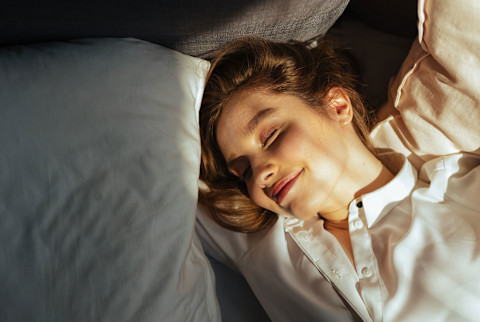I'm A Natural Night Owl: How I Trained Myself To Be Up At 6:30 A.M.

I'm someone who has always loved to sleep. But as I went through my medical training, sleep started to represent a struggle. I had less time to sleep, and then eventually I found it difficult to sleep even when I did have time. I dreaded trying to sleep every night because I knew it would be fraught with tossing and turning and lots of frustration.
It wasn't until I started to study the science behind sleep that I fell in love with it all over again. (I joke with my husband that sleep is my first love, but he's a close second!)
These days, I sleep best when I've been able to work out in the mornings and get in a short early afternoon power nap. I also sleep better when I can allow my schedule to drift a little closer to my natural circadian tendency, or chronotype.
I naturally want to go to bed late and sleep in, but my typical schedule isn't aligned with this circadian rhythm. Because I am such a night owl, I have to be very careful with consistency—going to sleep and waking up at the same time every day—so I don't drift out of rhythm. I've been able to adjust to an earlier schedule through consistency, but if I'm not careful, I can struggle to fall asleep at my desired time during the week.
When I'm on a long vacation or taking time off from work duties, I allow myself to shift a bit and tend to get better sleep.
Sleep is so important to me because I remember what it was like when I wasn’t getting it.
Sleep is so important to me because I remember what it was like when I wasn't getting it. I was absolutely a worse version of myself: more irritable, emotional, angry, and less productive. I wasn't living up to the potential that I knew I had because I was so exhausted and only had enough energy to "get by."
Sleep allows me to function at my best. It gives me the mental clarity, energy, and improved mood I need to be productive and successful in my everyday life. I feel more in control of myself, my emotions, and my day after I've gotten good sleep.

- Average hours I sleep a night: 8 to 9
- Ideal bedtime: 12 a.m.
- Ideal wake-up time: 9 a.m.
- Nightstand essentials: The Hatch sound machine, Bluetooth sleep headphones, a blackout mask, pillow spray, book of devotionals
- Favorite place I've ever slept: In my in-law's old spare bedroom, randomly. It was a very cool and dark room that had the most comfortable mattress I've ever slept on!
- Sleep bad habit: Sometimes sleeping in later than I should on the weekends
- Caffeine consumption: 1 cup in the mornings
- How I track my sleep: No specific tracker
- The last product or habit that changed my sleep for the better: Not looking at my phone when I wake up in the middle of the night
- The first thing I do when I wake up: Say a prayer

6:30 a.m.: It's a Tuesday morning, and I'm already starting to set myself up for good sleep. After waking up, I open my blinds to allow as much natural light in as possible. I also make my morning routine enjoyable to help buffer against stress that I may encounter during the day that might interfere with my sleep. I do this by listening to energizing music or an intriguing podcast while I'm getting ready and preparing my favorite coffee drink that puts me in a good mood. I start with a workout first thing in the morning, which also helps me to sleep well at night.
8:25 p.m.: I've been home from the office for a few hours. After watching some TV with my husband, I start winding down. I turn off the television, and I dim all the lights in my home to help bolster my natural melatonin release. I light a candle that contains some of my favorite essential oils for sleep, including lavender and chamomile, to help calm myself down before bed. I also take two tablets of magnesium glycinate to help promote relaxation, slow down my nervous system, and set the stage for sleep.
8:30 p.m.: I turn the thermostat down from 70 to 68 degrees Fahrenheit. This is to help facilitate the decrease in body temperature that has to occur when falling asleep. I start my soothing music playlist that includes mostly smooth R&B. The music really helps me to relax and gives me all the feels.
8:35 p.m.: I hop in a nice warm shower to promote a decrease in body temperature that helps me to fall and stay asleep. I then apply magnesium body butter. I find that layering the aromatherapy scents and magnesium to really help relax me before bed.
8:50 p.m.: I start my skin care routine and brush my teeth while listening to music.
9:05 p.m.: I grab a book to do some light reading before falling asleep. Reading helps me to feel relaxed and takes my mind off the worries or other thoughts lingering from the day.
9:25 p.m.: I top off my reading with a nightly devotional for about 5 minutes. This really puts me in a grateful and positive mood.
9:30 p.m.: I hit my pillow with a few sprays of pillow spray and throw on my blackout sleep mask to block all light while I sleep. I turn off my bedside lamp, turn on the white noise on my Hatch, and go to sleep.
